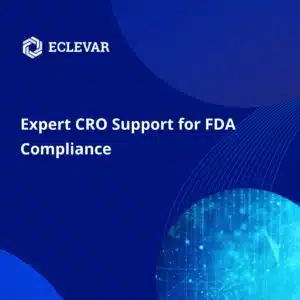CRO (Contract Research Organization) Expertise for Ensuring FDA Compliance
The Food and Drug Administration is responsible for the regulation of any firm that manufacture, repackage, relabel, and/or import medical devices in the United States. To be suited for the US market, FDA compliance must be followed throughout the entire process.
A quality Contract Research Organization is ready to assist documentation and assure security of your medical product, as well as effectiveness of the device, according to the substantial guidelines assembled by the FDA.
Keep reading and learn what you need to know about FDA compliance and CRO assistance to that matter.
FDA compliance for the medical device industry
The Food and Drug Administration in the U.S. is a competent authority responsible to set direction and procedures for companies such as medical devices, human and animal foods, dietary supplements, and cosmetics, so they are authorised to market their products and protect public health.
In the medical products industry, domestic or foreign manufacturers and distributors of devices must be registered and submitted with the FDA, unless a waiver is granted by the administration. Annually, between October 1st and December 31st ,the information must be verified, throughout the entire market-life of the product.
Product classification
Medical devices are classified into Class I, II, and III. This categorization indicates the regulatory FDA compliance the manufacturer must follow for approval application. You can read more about the description and details of medical device’s classification here.
Class I – Lowest risk
Products classified at the first category are the ones that represent minimal potential harm for patients. The devices are subject to a comprehensive set of regulatory authorities, called general control, that are applicable to any one of the classes. Class I medical devices can be required to submit a 510(k) but are often exempt of that.
Class II – Moderate risk
In comparison to class I devices, class II represents higher potential harm. The general controls are insufficient to provide assurance of safety and efficacy of these products. Class II medical devices are required to submit a 510(k) or they can be exempt of that.
Class III – High Risk
Class III devices are the ones that sustain/support life or that represents high risks of injury or illness. As class II devices do, general controls are insufficient for class III products but, in cases such as these, a Premarket Approval (PMA) is required.
Regulations and requirements
FDA speculates that medical devices distributed in the U.S. must comply with the following basic regulatory requirements:
- Establishment registration
- Medical Device Listing
- Premarket Notification 510(k) or Premarket Approval (PMA)
- Investigational Device Exemption for clinical studies
- Quality System regulation,
- Labelling requirements
- Medical Device Reporting (MDR)
In cases where the manufacturer/importer is submitting a device that already has approved uses in another country, there is the possibility of asking for equivalence of the documentation. Different regulatory jurisdictions utilise equivalence in different ways, from forming part of a clinical evaluation to offering a direct route to market.
Premarket Approval (PMA)
Premarket Approval is the FDA process of scientific and regulatory review to evaluate the safety and effectiveness of devices considered high risk (class III) in order to obtain marketing approval. The applicant must receive FDA approval of its PMA application in advance to putting the device on U.S. market.
This application requires a scientific, regulatory documentation, good science and scientific writing beeing a key to the approval. To obtain the level of quality expected by FDA, choosing a CRO to participate in all steps is of great importance, since any lack of required elements will lead to a negative response by the administration.
Premarket Notification 510(k)
When a Premarket Approval is not required, you must submit a 510(k) to the FDA. This submission provides regulators with technical, performance, and safety information on your new medical device. Mainly, 510(k) submission is required for medium-risk medical devices, also covering some lower-risk Class I.
FDA has detailed requirements regarding how you should organise and then make the submission. The best way to prepare the request is to partner up with an experienced and knowledgeable company that can provide analytical and documental services.
In the window of 90 days, FDA will review your submission and may send you one of the two letters:
- Refusal to Accept
- Additional Information
The first one meaning that the administration found your device not ready for clear, and the second asking for more information before proceeding the evaluation. Once approved, you will receive a letter with your 510(k) clearance, including a number for your medical device as well as the approved Indications for use.
ECLEVAR – A Expert CRO Support for FDA Compliance
Counting on an expert CRO company to support you on the completion of the requirements asked by the FDA can save you time and money in entering the U.S. market.
References:
https://www.fda.gov/medical-devices/device-advice-comprehensive-regulatory-assistance/overview-device-regulation
https://www.fda.gov/medical-devices/device-advice-comprehensive-regulatory-assistance/quality-and-compliance-medical-devices

